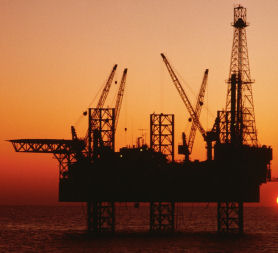Libyan oil: where does it go?
As BP’s business interests in Libya have come under scrutiny in the United States following the Gulf oil leak, Channel 4 News analysis reveals how more Libyan oil is exported to the US than the UK.

Yesterday Prime Minister David Cameron told Channel 4 News Political Editor Gary Gibbon that he was not prepared to launch an immediate inquiry into the links between BP and the release of the Lockerbie bomber Abdel Baset al-Megrahi.
It follows the prime minister’s meeting with four US Senators who are calling for an investigation into claims of a link with last year’s release of the Libyan national.
The senators want to investigate the oil group’s discussions with the UK government in 2007 as it expanded its business interests in Libya. In May of that year, the company signed an exploration and production agreement with Libya’s National Oil company worth a minimum of $900m.
Libya has the largest proven oil reserves (43.7 billion barrels) in Africa, although its potential is still under-explored.
British companies are not alone in spotting the commercial potential of Libya. Since President Bush lifted US trade sanctions on Libya in 2004, US companies have been keen to make the most of the opportunities that country’s energy reserves provides.
British interests in Libya
– In 2009 UK exports of goods to Libya were worth £423mn. (Source: HMRC Overseas Trade Statistics)
– In 2008 UK exports of services to Libya were worth £244mn (Source: ONS Balance of Payments Pink Book).
– It is estimated that 150 UK companies operate in Libya.
– Well known UK-based companies that are active in the Libyan market, include: Biwater, AMEC, British Airways, Mott MacDonald, Halcrow, Bhs, Marks & Spencer, Monsoon Accessorize, G4S, HSBC, Corus International, KPMG, GSK, AstraZeneca, JCB, Rentokil, Ernst & Young, PWC and Land Rover.
Where does Libya’s oil go?
According to official trade data, in 2008 the majority of Libyan oil exports were sold to European countries like Italy (523,000 barrels a day), Germany (210,000 barrels a day), Spain (104,000 barrels a day) and France (137,000 barrels a day).
The US Energy Information Administration estimates the United States imported an average of 102,000 barrels of oil a day from Libya in 2008, up from 56,000 barrels a day in 2005.
In 2008, this meant around seven per cent of Libya’s exports went to the US, compared to around three per cent to the UK, according to the EIA/Global Trade Atlas.
The al-Megrahi affair has loomed large over David Cameron’s first visit to the USA. In August 2009 the Scottish government set Mr al-Megrahi free on compassionate grounds, after prison doctors said he only had three months to live.
David Cameron insists that the decision was made independently by the Scottish government, but he has agreed to examine UK government papers to see how decisions relating to the release of Mr al-Megrahi were made.
US oil industry's Libyan presence
ExxonMobil returned to Libya in 2005 after a 25-year absence and last year its affiliate ExxonMobil Libya started drilling the country’s first deepwater exploration well.
Occidental Petroleum Corporation (Oxy) was the first American company to resume oil operations in Libya when US sanctions ended in 2005. In 2008 Oxy reached a 30-year agreement with Libya to redevelop and explore in the country’s most prolific oil producing area, the Sirte Basin. It will invest $5bn in the project over the next five years.
ChevronTexaco Corp's successful bid on one onshore block in Libya's first exploration license round marked its return to the African country after an absence of 28 years. The company's 2009 annual report showed that its oil and gas holdings in Libya is 2.7mn acres, its largest holdings in Africa after Nigeria. Energy services company Halliburton has worked with Shell in Libya to develop a testing tool that can be operated at high pressure and high temperature wells.
-
Latest news
-
What do Tory heartland voters want? A view from East Sussex4m

-
IDF ‘tactical pause’ to allow Gaza aid criticised by Israel leader Netanyahu3m

-
Social media ‘part of the problem’ in undermining politician security, says former MP5m

-
Conservatives and Labour under pressure to explain NHS plans3m

-
Euro 2024 shooting: man with axe shot by Hamburg police3m

-




